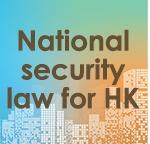The Education Bureau on Thursday unveiled guidelines and a curriculum framework on national security education, which requires primary and secondary schools to prevent activities that might contravene the National Security Law for Hong Kong.
In a statement, a bureau spokesperson said schools must make sure that campuses are free of political and illegal activities in order to create a safe study environment for students.
Safeguarding national sovereignty, security and development interests is the constitutional duty of the Hong Kong Special Administrative Region, and school employees and students are in it together with all Hong Kong people, the spokesperson said.
It’s the school’s responsibility to ensure that activities held on campus do not contravene local laws, including the security law, the bureau said in the statement, which was released to all primary and secondary schools.
ALSO READ: Schools asked to act on national security endangering activities on campus
Schools should forbid outsiders from entering the school campus to conduct activities involving political propaganda, and are advised to seek assistance from police when they suspect illegal acts, according to the guideline.
It’s the school’s responsibility to ensure that activities held on campus do not contravene local laws, including the National Security Law for Hong Kong, the Education Bureau said in a statement
Schools must also watch out for political activities in the vicinity of the campus that may disturb teachers and students.
Schools must also help students correctly understand the law and the concepts relating to national security to cultivate a sense of national security and law-abiding behavior, the bureau stressed.
The guidelines issued by the bureau provide concrete measures and examples of how to carry out training for teachers and students, as well as how to follow up on violations.
International and private schools are also required to follow the guidelines and assist their students, regardless of ethnicity or nationality, to correctly understand the security law and the concept of national security, according to the bureau.
All schools must submit their respective work plans and report to the bureau, and use their discretion on other appropriate measures to enhance a sense of national identity among students.
National security education is an integral part of national education, the spokesperson said.
READ MORE: Educators back plan to teach security law in HK schools
The national security education will follow the teaching model of the Constitution and the Basic Law by incorporating the national security education in various subjects
Such education should not be restricted to the provisions of the law, but the legislative intent and background of the law, as well as domains that may encounter national security, the bureau added. These domains include security on economy, culture, internet and ecology.
Thus, the national security education will follow the teaching model of the Constitution and the Basic Law by incorporating the national security education in various subjects. The framework set out by the bureau provides examples of how to organically link national security education with general studies in the primary school curriculum, and geography and biology in the secondary school curriculum.
The education authority will continue to update teaching materials to incorporate national security education into the existing curriculum setting. A three-hour specialized session on national security will be added to the 15-hour independent chapter designated for the Constitution and the Basic Law in the curriculum for students of secondary 1 to 3. Meanwhile, audio picture books on national security will be made specifically for primary pupils.
READ MORE: Various sectors support national security education for HK youth
Under the new guidelines, primary school students are required to learn the meanings of the national flag and emblem as well as how to sing the national anthem. They should get to know that the police, medical workers, and the People’s Liberation Army are there to protect the Hong Kong public.
Secondary students will be asked to learn what constitutes the four crimes outlawed by the security law, and the roles and importance of national institutions and central government bodies stationed in Hong Kong.
Key takeaways of what HK students need to learn about national security
Primary 1-3:
The meaning of the national flag and the national emblem, how to sing the national anthem;
Origin of “one country, two systems” and the Basic Law;
Get to know Hong Kong departments enforcing the laws and maintaining the rule of law;
Get to know those who protects Hong Kong public (police, medical workers and the People’s Liberation Army).
Primary 4-6:
The country’s territory and geographical features;
Importance of homeland security and resource security;
Historical events having a significant impact on today’s society (Opium War; reform and opening-up);
Relationship between the central government and HKSAR;
Legislative background and purpose of the National Security Law.
Secondary 1-3:
Understand national security’s definition and its 13 domains such as politics, economy and technology;
National security issues of world history, such as colonial expansion, localized wars and terrorism;
The relationship between the Constitution and the Basic Law.
Secondary 4-6:
Opportunities and challenges facing China’s participation in international affairs;
Contemporary issues related to national security, such as territorial disputes and economic crises;
Roles and importance of national institutions and central government’s bodies stationed in Hong Kong.




